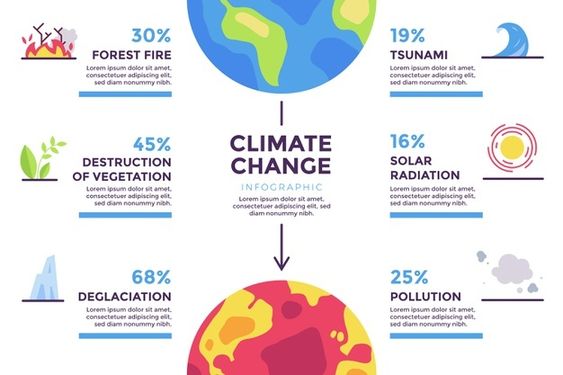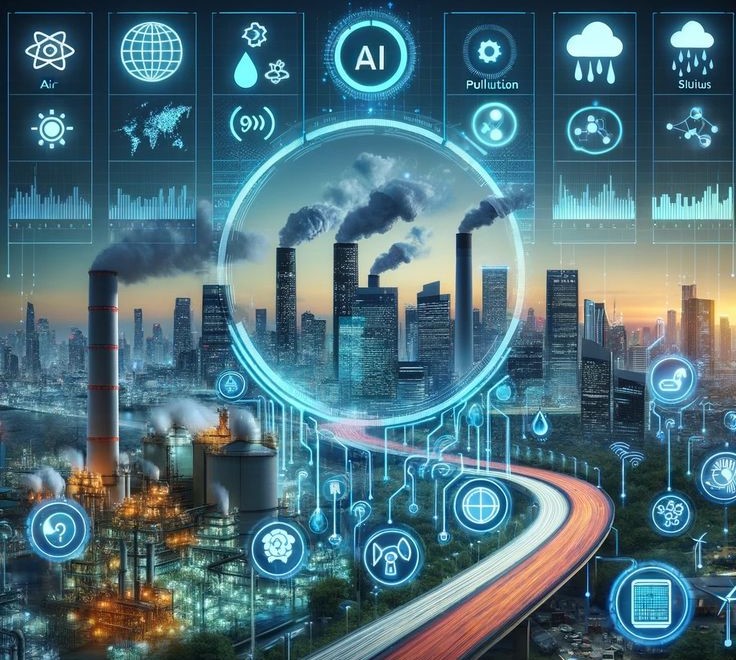Climate change is no longer a distant threat; it is a pressing reality impacting our planet and human life in many ways. The urgent need to address the global climate crisis has sparked countless debates, discussions, and research initiatives globally. The following post offers compelling climate change topic ideas, exploring a wide range of perspectives and areas of inquiry. This article boasts incredible resources for learners seeking help with writing research papers about climate change.
What is Climate Change?
Climate change refers to the long-term shift in global weather patterns, primarily caused by the increasing concentration of greenhouse gases in the atmosphere. These gases, like carbon dioxide and methane, act like a blanket, trapping heat from the sun and causing the Earth’s temperature to rise.
Imagine a greenhouse: the glass roof traps heat, making it warmer inside than outside. The same principle applies to our atmosphere. Natural processes like volcanic eruptions and decomposition release greenhouse gases into the atmosphere. However, human activities like burning fossil fuels for energy, deforestation, and industrial processes are significantly increasing their concentration. This amplified greenhouse effect is leading to a warming planet.

The consequences of climate change are far-reaching and alarming. The effects of climate change include;
- Rising global temperatures: Leading to more frequent and intense heat waves, droughts, and wildfires.
- Rising sea levels: Caused by melting glaciers and ice sheets, threatening coastal communities and ecosystems.
- Extreme weather events: More frequent and severe storms, floods, and droughts, disrupting economies and displacing people.
- Impact on ecosystems: Changes in temperature, rainfall, and sea levels are disrupting delicate ecosystems, leading to biodiversity loss and threats to food security.
Climate change is not a future threat, it’s a present reality. Understanding this phenomenon and its consequences is crucial to taking action, mitigating its impacts, and ensuring a sustainable future for our planet. All the consequences described above can generate an ideal climate change topic for your paper.
Top Climate Change Topic Ideas for Research Papers
1. The Interplay of Greenhouse Gases and Global Warming
- Focus: Explore the complex relationship between greenhouse gas emissions, particularly CO2, and their impact on global warming.
- Examples:
- The role of deforestation in amplifying global warming.
- Examining the effectiveness of carbon capture technologies.
- The impact of methane emissions from livestock and agriculture.
- Analyzing the future projections of rising global temperatures and their consequences.
2. The Shifting Landscape of Extreme Weather Events
- Focus: Analyze how climate change is intensifying extreme weather events like hurricanes, droughts, floods, and wildfires.
- Examples:
- The link between climate change and the increasing frequency and intensity of hurricanes.
- The impact of drought on agricultural yields and water resources.
- The role of climate change in exacerbating wildfires and their devastating consequences.
- The social and economic repercussions of extreme weather events.
3. The Impact of Climate Change on Biodiversity and Ecosystems
- Focus: Explore how climate change is affecting biodiversity and ecosystems, including endangered species, habitat loss, and the disruption of natural processes.
- Examples:
- The impact of rising sea levels on coastal ecosystems and marine life.
- The effect of climate change on coral reefs and their vital role in marine biodiversity.
- Investigating the role of invasive species in disrupting ecosystems under changing climate conditions.
- Examining the potential for climate-induced extinctions.
4. The Potential of Renewable Energy Sources
- Focus: Explore the various renewable energy sources like solar, wind, hydro, and geothermal power and their potential for mitigating climate change.
- Examples:
- Analyzing the economic viability and scalability of renewable energy sources.
- Evaluating the environmental impact of renewable energy technologies.
- The role of government policy and incentives in promoting renewable energy adoption.
- Exploring the future of renewable energy in a global context.
5. The Role of Carbon Pricing and Market-Based Solutions
- Focus: Examine the effectiveness of carbon pricing mechanisms like carbon taxes and cap-and-trade systems in reducing emissions.
- Examples:
- Analyzing the impact of carbon pricing policies on consumer behavior and industry practices.
- Evaluating the cost-effectiveness of carbon pricing compared to other mitigation strategies.
- Investigating the potential for international cooperation in implementing carbon pricing mechanisms.
- Examining the challenges and opportunities of carbon offsets and trading systems.
6. The Importance of Energy Efficiency and Conservation
- Focus: Discuss the crucial role of energy efficiency and conservation in reducing energy demand and mitigating climate change.
- Examples:
- The impact of energy efficiency standards on building design and household appliances.
- Investigating the effectiveness of public education campaigns in promoting energy conservation.
- The role of smart technologies in optimizing energy use in homes and businesses.
- Analyzing the potential for energy efficiency improvements in transportation and industry.
7. Climate Change and Global Food Security

- Focus: Examine the impact of climate change on agricultural production, food security, and the global food system.
- Examples:
- The impact of extreme weather events on crop yields and livestock production.
- Investigating the potential for climate-resilient agriculture practices.
- The challenges of ensuring food security for vulnerable populations in the face of climate change.
- Analyzing the potential for food price volatility and disruptions to global food trade.
8. Climate Change and Water Resources Management:
- Focus: Explore the impact of climate change on water scarcity, drought, and the challenges of water resource management.
- Examples:
- The impact of climate change on freshwater supplies and the potential for conflicts over water resources.
- Analyzing the effectiveness of water conservation strategies in mitigating the impacts of climate change.
- Investigating the potential for desalination and other water treatment technologies to address water scarcity.
- Examining the role of water infrastructure in adapting to climate change.
9. Climate Change and Human Health
- Focus: Analyze the impact of climate change on human health, including heat-related illnesses, respiratory problems, and the spread of infectious diseases.
- Examples:
- The link between climate change and the rise of vector-borne diseases like malaria and dengue fever.
- Investigating the impact of heat waves on cardiovascular health and mortality rates.
- The challenges of providing healthcare services and ensuring public health security in the face of climate change.
- Examining the potential for climate-related displacement and migration.
10. Climate Change and Social Equity
- Focus: Explore the unequal impact of climate change on different communities and the need for equitable solutions.
- Examples:
- The vulnerability of marginalized communities to the impacts of climate change.
- Analyzing the intersection of climate change with issues of race, gender, and socioeconomic status.
- Investigating the role of climate justice movements in advocating for equitable solutions.
- Examining the potential for climate change to exacerbate existing social inequalities.
11. Climate Change and Global Governance
- Focus: Analyze the role of international cooperation and global governance in addressing climate change.
- Examples:
- The effectiveness of the Paris Agreement and other international climate agreements.
- The challenges of coordinating climate action among different countries and regions.
- Investigating the role of international institutions in promoting climate finance and technology transfer.
- Examining the potential for new approaches to global climate governance.
12. Climate Change and Climate Communication
- Focus: Explore the importance of effective communication in raising awareness, building public support, and promoting action on climate change.
- Examples:
- The impact of media coverage on public understanding of climate change.
- Analyzing the effectiveness of different communication strategies in engaging diverse audiences.
- Investigating the role of social media and online platforms in shaping climate narratives.
- Examining the challenges of communicating the complex science of climate change to the public.
13. Climate Change and Climate Engineering
- Focus: Consider the potential and risks of climate engineering technologies, such as solar radiation management and carbon dioxide removal.
- Examples:
- Analyzing the feasibility and effectiveness of different climate engineering techniques.
- Investigating the ethical and governance challenges of deploying climate engineering technologies.
- Examining the potential unintended consequences and risks of climate engineering.
- Discussing the role of climate engineering in a portfolio of climate solutions.
14. Climate Change and Green Technology
- Focus: Look into the development and deployment of green technologies, such as electric vehicles, sustainable agriculture, and smart grids.
- Examples:
- Analyzing the impact of green technologies on reducing emissions and mitigating climate change.
- Investigating the economic feasibility and market potential of green technologies.
- Examining the role of government policy and investment in promoting the adoption of green technologies.
- Discussing the potential for green technologies to create new industries and jobs.
15. Climate Change and Artificial Intelligence

- Focus: Explore how artificial intelligence (AI) can be used to address climate change challenges, from optimizing renewable energy systems to forecasting climate impacts.
- Examples:
- Analyzing the potential for AI to improve climate models and predictions.
- Investigating the use of AI in developing climate-resilient infrastructure and agriculture.
- Examining the ethical implications of using AI in climate change decision-making.
- Discussing the role of AI in promoting climate action and sustainability.
Climate change is a complex and multifaceted issue that demands our attention and action. The climate change topic ideas above provide a framework for exploring the science, impacts, solutions, and societal implications of this global crisis. Whether you are a student, researcher, or concerned citizen, engaging with these topics can help you deepen your understanding of climate change. Familiarizing yourself with these topics can also help with formulating solutions for a more sustainable future. Remember, tackling this challenge requires a multidisciplinary approach, encompassing various fields of study, including science, technology, economics, policy, and social justice. By engaging with these diverse perspectives, we can foster a deeper understanding of the challenges and opportunities presented by climate change and work towards a more resilient and sustainable future for all.
Get Professional Research Paper Writing Help
The above post has described a wide range of climate change topics for learners and educators. However, choosing a suitable climate change topic for your research paper from those vast options can be a daunting task. Exemplarydissertations.com offers the best research paper help to enable you navigate the process of academic writing with ease. Our services cover topic suggestion, research paper writing, proof reading, editing, plagiarism check and removal.

